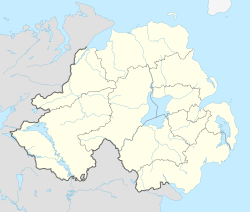Monkstown, County Antrim
Monkstown, County Antrim | |
|---|---|
electoral ward and townland | |
 | |
| Coordinates: 54°41′05″N 5°53′42″W / 54.68478°N 5.89505°WCoordinates: 54°41′05″N 5°53′42″W / 54.68478°N 5.89505°W |
Monkstown is a townland[1] (of 811 acres)[2] and electoral ward in County Antrim, Northern Ireland. It is within the urban area of Newtownabbey and the Antrim and Newtownabbey Borough Council area. The townland was previously called Ballynamanagh (from Irish Baile na Manach 'townland of the monks')[1][3][4][5] It is also situated in the civil parish of Carnmoney and the historic barony of Belfast Lower.[2]
Monkstown is said to be the burial place of Fergus Mor Mac Eirc, king of Dal Riata.[6] which suggests a religious house was established in the 5th century CE. It possibly became a grange- a farm that was managed by a monastery, and was possibly associated with the monastery at Woodburn in Carrickfergus.[7]
Railways[]
Monkstown railway station is currently closed on the Belfast-Derry railway line run by Northern Ireland Railways.
Education[]
Schools and colleges which serve the area include , Hollybank Primary School and University of Ulster.[citation needed]
Sport[]
The local association football clubs, 18th Newtownabbey Old Boys F.C. and Nortel F.C., play in the Northern Amateur Football League.[citation needed]
References[]
- ^ a b Placenames Database of Ireland
- ^ a b "Monkstown". IreAtlas Townlands Database. Retrieved 12 April 2015.
- ^ Reeves, William (September 2009). Ecclesiastical Antiquities of Down, Connor, and Dromore, Consisting of a taxation of these Dioceses. BiblioBazaar, LLC. p. 69. ISBN 978-1-113-69516-1. Retrieved 2010-02-04.
- ^ Hill, George (1873). An historical account of the Macdonnells of Antrim : Including Notices Of Some Other Septs, Irish And Scottish. Kessinger Publishing. p. 453. ISBN 1-4326-4080-1. Retrieved 2010-02-04.
Ballynamanagh.
- ^ St. J. Clarke, The Rev. H. J. (1938). Thirty Centuries in South East Antrim. The Parish of Coole or Carnmoney. p. 128. Retrieved 2010-02-04.
- ^ Hill, George. An historical account of the Macdonnells of Antrim : Including Notices Of Some Other Septs, Irish And Scottish. Kessinger Publishing. ISBN 1-4326-4080-1. Retrieved 2019-07-24.
- ^ McCann, Edmund; Reeves, William; McCana, Edmund (1854). "Irish Itinerary of Father Edmund MacCana". Ulster Journal of Archaeology. 2: 44–59. JSTOR 20608707.
- Wards of Northern Ireland
- Townlands of County Antrim
- Civil parish of Carnmoney
- County Antrim geography stubs

